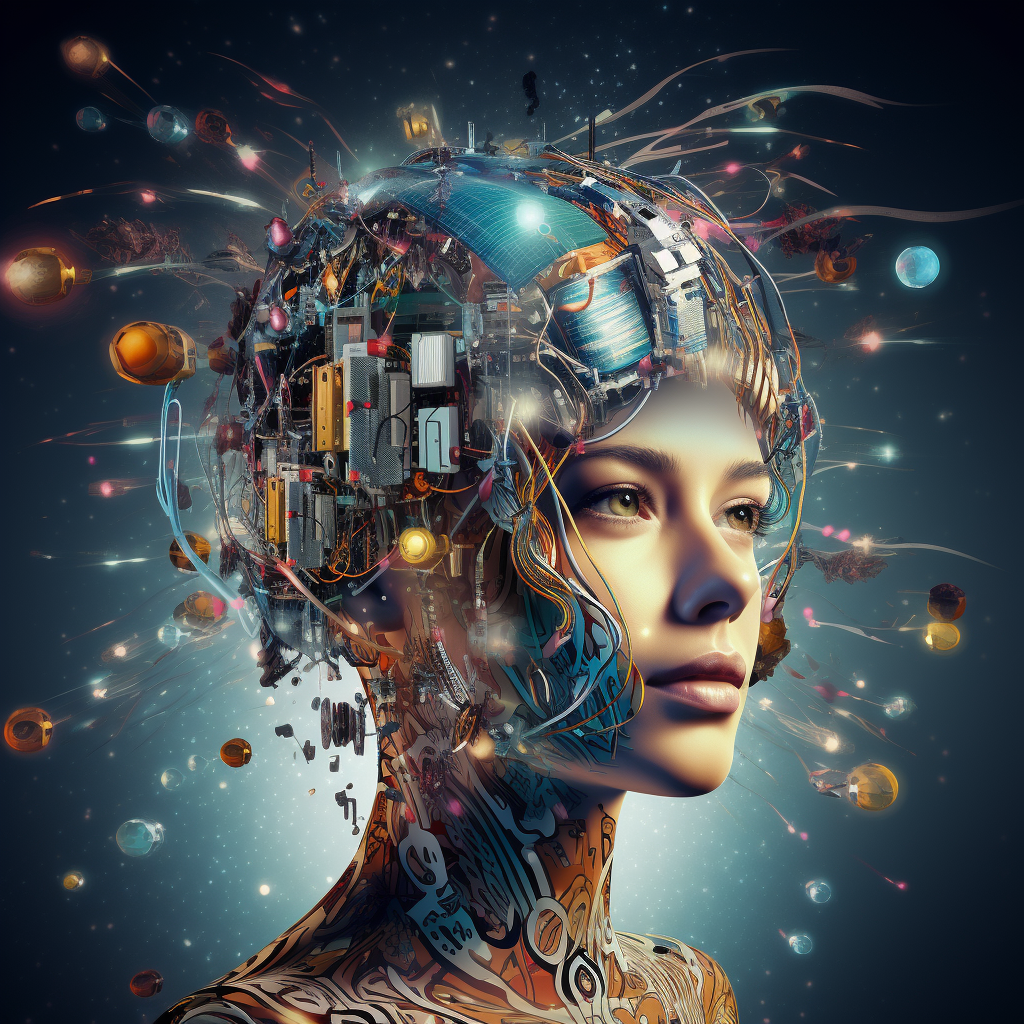Reading Time: 11 minutes

Introduction
In the rapidly evolving world of digital marketing, Artificial Intelligence (AI) has emerged as a game-changer, redefining how brands interact with their audience. At its core, AI in marketing is about leveraging machine learning, data analysis, and other advanced technologies to gain deeper insights into consumer behavior, streamline marketing efforts, and enhance customer experiences.
The importance of AI tools in the current marketing landscape cannot be overstated. In an era where personalization is key, and data is the new currency, AI stands as a critical tool for marketers. It’s not just about handling vast amounts of data; it’s about interpreting this data to predict trends, personalize content, and make real-time decisions that keep businesses ahead in a competitive marketplace.
From chatbots that provide 24/7 customer service to algorithms that deliver personalized shopping recommendations, AI is transforming the marketing landscape in profound ways. It enables marketers to craft strategies that are not only data-driven but also customer-centric. This shift towards AI-driven marketing isn’t just a trend; it’s a necessary evolution, enabling brands to meet the increasingly complex and dynamic needs of today’s digital consumer.
As we delve deeper into this blog post, we will explore the various facets of AI in marketing. We’ll uncover how AI tools are reshaping marketing strategies, the benefits and challenges they bring, and how they’re paving the way for a future where marketing is more intelligent, responsive, and effective than ever before.
Join us on this journey to understand how AI is revolutionizing the marketing world and why embracing these tools isn’t just an option but a necessity for marketers aiming to thrive in the digital age.
Understanding AI in Marketing
Definition of AI Marketing At its simplest, Artificial Intelligence (AI) in marketing refers to the integration of AI technology to make marketing activities more efficient and effective. This involves using AI algorithms and machine learning techniques to analyze data, predict trends, and automate decision-making processes. AI in marketing harnesses the power of data analysis, natural language processing, and pattern recognition to provide insights that were previously inaccessible or too time-consuming to uncover.
AI marketing tools are designed to learn from data and improve over time. They can identify patterns in customer behavior, predict future trends, and even make decisions based on real-time data. This level of sophistication allows marketers to create more targeted, personalized, and dynamic marketing campaigns.
How AI is Transforming Marketing Strategies AI is not just a tool; it’s a paradigm shift in how marketing strategies are developed and executed. Here’s how AI is making that transformation:
- Personalization at Scale: AI enables the creation of highly personalized customer experiences. By analyzing customer data, AI can help tailor marketing messages and offers to individual preferences and behaviors. This level of personalization, once impossible due to the sheer volume of data and required processing power, is now achievable with AI.
- Predictive Analytics: AI excels at predicting customer behavior based on historical data. Marketers can use these predictions to anticipate customer needs and preferences, enabling them to be proactive rather than reactive. This foresight can be a significant advantage in planning marketing strategies.
- Enhanced Customer Insights: AI tools can analyze data from various sources to provide a more comprehensive view of the customer. This insight goes beyond basic demographics to include behavioral patterns, preferences, and even sentiment analysis. Such insights allow marketers to craft more effective and resonant messaging.
- Automation and Efficiency: AI automates routine tasks such as data analysis, customer segmentation, and even content creation. This automation frees marketers to focus on more strategic aspects of their campaigns and reduces the time and resources spent on manual tasks.
- Real-Time Decision Making: AI systems can process and analyze data in real-time, allowing marketers to make quick decisions based on the latest information. This agility is crucial in a digital landscape where consumer preferences and market dynamics can shift rapidly.
- Optimization of Marketing Spend: By analyzing which channels and strategies are most effective, AI helps optimize marketing budgets. Marketers can allocate resources more efficiently, ensuring the best return on investment.
AI in marketing represents a significant leap forward in how marketing strategies are formulated and executed. By harnessing the power of AI, marketers can create more effective, efficient, and personalized campaigns that resonate with their target audience. As we continue to explore AI’s role in marketing, it becomes clear that its impact is not just transformative but also essential for staying competitive in a digital-first world.

Key AI Marketing Tools
In the realm of AI-driven marketing, several tools stand out for their ability to enhance and streamline marketing efforts. These tools not only simplify complex tasks but also open up new possibilities for engaging with customers. Let’s delve into some of the key AI marketing tools revolutionizing the industry:
- AI-driven Data Analysis Tools
- Customer Segmentation: AI algorithms can analyze customer data to segment audiences more precisely than ever before. By identifying patterns and behaviors, AI helps marketers target specific groups with tailored messages.
- Predictive Analytics: These tools use historical data to predict future trends and customer behaviors. Marketers can anticipate needs, preferences, and potential churn, enabling them to strategize proactively.
- Content Creation Tools
- Automated Writing Assistants: These AI tools can generate written content, from product descriptions to blog posts, by learning from existing data and styles. They help in scaling content production without compromising quality.
- Graphic Design Tools: AI-powered design tools can create visuals, suggest design elements, and even optimize layouts based on best practices and user engagement data.
- Personalization Engines
- Recommendation Systems: These systems analyze past behavior to suggest products or content. E-commerce sites and content platforms extensively use AI to personalize user experiences, increasing engagement and conversion rates.
- Personalized Advertising: AI tools can tailor advertisements to individual users based on their browsing history, preferences, and engagement, making ads more relevant and effective.
- Chatbots and Customer Service Automation
- AI-powered chatbots are revolutionizing customer service. They provide instant responses to customer inquiries, can handle a large volume of queries simultaneously, and are increasingly capable of complex interactions. This not only improves customer experience but also reduces the workload on human staff.
- Social Media Management Tools
- Automated Posting: These tools schedule and automate social media posts based on when audiences are most active, optimizing for engagement.
- Sentiment Analysis: AI algorithms can analyze social media comments and posts to gauge public sentiment about brands and products. This insight is invaluable for reputation management and marketing strategy refinement.
These AI marketing tools represent just the tip of the iceberg in a rapidly expanding toolkit. By leveraging these technologies, marketers can gain a significant edge in understanding and engaging their audience, optimizing their strategies, and ultimately achieving better results with greater efficiency.
Benefits of AI in Marketing
The integration of AI in marketing strategies brings a plethora of benefits that not only streamline marketing operations but also lead to more effective campaigns and customer interactions. Here are some of the key benefits of AI in marketing:
- Enhanced Customer Insights and Targeting
- AI-driven analytics tools provide deep insights into customer behavior, preferences, and trends. By analyzing large datasets, AI helps marketers understand their audience at a granular level.
- This enhanced understanding enables precise targeting. Marketers can create campaigns that resonate with specific audience segments, leading to higher conversion rates and more effective use of marketing budgets.
- Increased Efficiency and Productivity
- AI automates repetitive and time-consuming tasks such as data analysis, report generation, and even content creation. This automation frees up marketers to focus on strategy and creativity.
- AI tools can manage and optimize campaigns in real-time, adjusting parameters for maximum effectiveness without constant human intervention. This leads to increased productivity and efficiency in marketing operations.
- Improved Customer Engagement and Satisfaction
- Personalization is key to customer engagement, and AI excels at delivering personalized experiences. From personalized product recommendations to tailored email marketing, AI ensures that customers receive content that is relevant to their interests and needs.
- AI-powered chatbots and customer service tools provide quick, consistent, and helpful responses to customer inquiries, improving overall customer satisfaction. They are available 24/7, ensuring that customer support is always accessible.
- Real-Time Decision Making and Adaptability
- AI systems can process and analyze data in real-time, allowing marketers to make informed decisions quickly. This capability is crucial in a dynamic market where trends can change rapidly.
- AI’s adaptability means that marketing strategies can be adjusted on-the-fly based on real-time data. For example, if an AI system detects a drop in engagement, it can automatically tweak the campaign to try and improve results.
AI brings a transformative approach to marketing. By providing enhanced customer insights, increasing efficiency, improving engagement and satisfaction, and enabling real-time decision-making, AI tools empower marketers to execute more effective and dynamic strategies. The result is not just a more efficient marketing department, but a more responsive and customer-focused approach to marketing.

Challenges and Considerations
While the benefits of AI in marketing are substantial, there are also challenges and considerations that need to be addressed to ensure successful implementation and ethical practice. Here are some key areas to consider:
- Ethical Considerations in AI Marketing
- Data Privacy: With AI relying heavily on data, concerns around privacy are paramount. Marketers must ensure that they are compliant with data protection regulations like GDPR and are transparent with customers about how their data is used.
- Bias in AI: AI systems can inadvertently perpetuate biases if they are trained on skewed or unrepresentative data. It is crucial to continually assess and correct AI models to ensure they are fair and unbiased.
- Overcoming the Learning Curve and Integration Challenges
- Technical Expertise: Implementing AI in marketing strategies often requires a certain level of technical knowledge. Marketers may need to upskill or collaborate closely with technical teams to make the most out of AI tools.
- Integration with Existing Systems: Integrating AI tools with existing marketing platforms and systems can be a challenge. It requires careful planning and often a tailored approach to ensure that new and old systems work seamlessly together.
- Staying Updated with Evolving AI Technologies
- Continuous Learning: The field of AI is rapidly evolving, with new advancements and tools emerging regularly. Marketers need to stay informed about the latest developments to leverage these technologies effectively.
- Adapting to Change: As AI technologies evolve, marketing strategies may also need to adapt. This requires a degree of flexibility and a willingness to experiment with new tools and approaches.
Navigating these challenges requires a balanced approach, where the benefits of AI are harnessed responsibly and ethically. By addressing these considerations head-on, marketers can not only mitigate risks but also build more effective, customer-centric marketing strategies that are sustainable and forward-looking.
Examples
To illustrate the power and potential of AI in marketing, let’s explore a few real-world examples of businesses that have successfully implemented AI marketing tools and the remarkable results they achieved.
- Case Study 1: E-commerce Giant Enhances Customer Experience
- Background: A leading e-commerce company implemented AI to personalize shopping experiences.
- AI Implementation: They used AI-driven recommendation engines to suggest products to customers based on their browsing and purchase history.
- Results: The implementation led to a significant increase in customer engagement and sales. The personalized recommendations accounted for a substantial percentage of their revenue, proving the effectiveness of AI in enhancing customer experiences and boosting sales.
- Case Study 2: Global Retailer Optimizes Inventory and Marketing
- Background: A global retail chain turned to AI to improve inventory management and marketing strategies.
- AI Implementation: They utilized AI for predictive analytics, forecasting demand for products in different regions and optimizing their inventory accordingly. AI was also used to tailor marketing campaigns to specific customer segments.
- Results: This led to a reduction in overstock and understock situations, optimizing operational costs. Their targeted marketing campaigns saw higher conversion rates, demonstrating AI’s capability in streamlining operations and enhancing marketing efficiency.
- Case Study 3: Travel Company Boosts Bookings with AI Chatbots
- Background: A travel and hospitality company integrated AI chatbots to improve customer service.
- AI Implementation: The chatbots were designed to handle bookings, answer queries, and provide personalized travel recommendations.
- Results: The company saw an increase in customer satisfaction and a higher rate of bookings through the chatbot service. The AI chatbots efficiently managed high volumes of customer interactions, reducing wait times and improving the overall customer experience.
- Case Study 4: Beauty Brand Achieves Social Media Success
- Background: A beauty brand leveraged AI to enhance its social media marketing.
- AI Implementation: They used AI tools for sentiment analysis and trend prediction on social media platforms to tailor their content strategy.
- Results: The brand saw a significant increase in social media engagement and a better understanding of customer preferences. Their AI-driven strategy resulted in more effective and resonant social media campaigns.
These case studies demonstrate that AI marketing tools can be successfully implemented across various industries, leading to enhanced customer experiences, operational efficiency, and increased revenue. By analyzing and learning from these real-world applications, businesses can gain insights into how to effectively integrate AI into their own marketing strategies.

Future of AI in Marketing
As we look towards the future, the role of AI in marketing is poised to grow even more influential and transformative. Here are some predictions for the evolution of AI in marketing and emerging technologies to watch out for:
- Advanced Personalization and Hyper-Targeted Content
- AI will enable even more sophisticated levels of personalization, going beyond simple product recommendations to creating fully personalized user experiences. We can expect hyper-targeted content that adapts in real-time to user interactions, providing unparalleled relevance and engagement.
- Voice and Visual Search Optimization
- With the rising use of voice assistants and visual search technologies, AI will play a crucial role in optimizing content for these platforms. Marketers will need to adapt their strategies to accommodate voice search queries and visual searches, leveraging AI to understand and respond to these new consumer behaviors.
- Augmented Reality (AR) and Virtual Reality (VR) in Marketing
- AI, combined with AR and VR, will create immersive and interactive marketing experiences. These technologies can transport customers into different worlds or let them experience products in a virtual space, providing innovative ways to engage and captivate audiences.
- AI-driven Predictive Customer Journeys
- Future AI systems will not only analyze past customer behavior but will also predict future customer journeys. This will allow marketers to anticipate needs and craft strategies that align with the potential paths customers might take, leading to more effective and timely engagements.
- Ethical AI and Responsible Marketing
- As AI becomes more integrated into marketing, there will be a growing focus on ethical AI practices. This includes ensuring data privacy, avoiding bias in AI algorithms, and being transparent about AI-driven interactions. Responsible AI will become a cornerstone of customer trust and brand reputation.
- Integration of AI with IoT (Internet of Things)
- The integration of AI with IoT devices will open new avenues for contextual marketing. Smart devices will provide real-time data that AI can analyze to offer timely and contextually relevant marketing messages, enhancing the customer experience in everyday life.
- Continued Evolution of AI Algorithms
- AI algorithms themselves will continue to evolve, becoming more efficient, accurate, and capable of handling complex tasks. This will enable marketers to gain deeper insights, make more informed decisions, and execute more sophisticated marketing strategies.
The future of AI in marketing is not only about the advancement of technology but also about how it can be used responsibly and creatively to connect with customers in meaningful ways. The possibilities are vast, and the potential for innovation is limitless. Marketers who stay informed and adaptable to these changes will be the ones who thrive in this new era of AI-driven marketing.
Conclusion
As we have explored throughout this blog post, the integration of Artificial Intelligence in marketing is not just a fleeting trend but a fundamental shift in how we approach marketing in the digital age. AI is reshaping the landscape with advanced data analysis, personalized customer experiences, efficient automation, and real-time adaptability.
Summary of Key Points
- AI in marketing offers enhanced customer insights, allowing for more precise targeting and personalization.
- The efficiency and productivity gains from AI automation free up valuable resources and time for strategic thinking and creativity.
- AI enhances customer engagement and satisfaction through personalized interactions and responsive customer service.
- The challenges, including ethical considerations and the need for ongoing learning and adaptation, are significant but manageable with the right approach.
Encouragement for Marketers to Embrace AI Tools To marketers navigating this evolving landscape, the message is clear: embracing AI tools is not just beneficial; it’s essential for staying competitive and relevant. AI offers opportunities to understand and engage with your audience like never before. By adopting AI, marketers can unlock new levels of efficiency and effectiveness in their strategies.
Final Thoughts on the Future of Marketing with AI Looking ahead, the future of marketing with AI is incredibly promising. As AI technologies continue to advance, they will open up even more possibilities for innovative, effective, and ethically responsible marketing practices. The potential for AI to enhance customer experiences, drive business growth, and create new marketing paradigms is immense.
In conclusion, the journey into AI-driven marketing is an exciting and necessary one. For those willing to embrace these changes, the rewards are substantial. As we continue to innovate and adapt, the future of marketing with AI holds incredible promise for creating more meaningful, efficient, and impactful marketing experiences.

